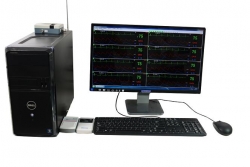Wechat QR code

TEL:400-654-1200

TEL:400-654-1200

Standard operating procedure for dynamic electroencephalograph
Environmental requirements
1.1 the dynamic electroencephalograph should be placed in the shielding room to prevent the interference of the external alternating current (ac) noise signal, to ensure the stability of eeg recording and the clear waveform.Meilun
1.2 at room temperature to keep warm (not less than 18 ℃), avoid myoelectricity interference caused by cold.
1.3 irrelevant personnel should not walk indoors at will, especially close to the subject, to avoid the interference caused by the magnetic field.Meilun

2 preparation
2.1 make it clear to the examinee to wash hair with soap and water the day before the examination.
2.2 the patient is required to stop taking sedatives, sleeping pills and antiepileptic drugs 3 days before the examination.
2.3 the examinee should eat on the day of examination, not on an empty stomach.
2.4 for those who receive the examination for the first time, explanations shall be made in advance to eliminate the tension and better cooperate with the examination.
3. Skin treatment and electrode placement
3.1 if there is dirt or excessive hair on the skin where the electrode is placed, clean the skin or shave the hair in advance.
3.2 apply the conductive paste to the skin where the electrode is placed. Do not just apply the conductive paste to the electrode. Avoid using cotton swab or brush to touch normal saline or alcohol instead of conductive paste. The contact impedance between skin and electrode is relatively high in this kind of method.
3.3 in strict accordance with the international unified standard, the conventional 16-lead eeg electrode is accurately placed, and the sphincter electrode in special cases is placed according to the unified standard.
3.4 in order to judge whether there are other interference factors, the electroencephalogram (emg) and mandibular electromyography (emg) electrodes should be placed simultaneously.
electroencephalography
4.1 impedance, noise and paper feeding speed should be adjusted before formal eeg recording. Observe whether the calibration under the tracing chart is accurate, and adjust timely if there is any problem.
4.2 follow the eeg instructions for standard operation. Conventional guide includes I guide, II guide, III guide and IV guide. V guide and VI guide can be added according to the application situation.
4.3 hyperventilation and flash stimulation should be performed to induce the presence of abnormal waveforms in patients suspected to have epilepsy.
4.4 if most of the leads are normal and only one or two of them are in a straight line, it shall be noted whether the lead is in poor contact and the electrode shall be reinstalled.
4.5 if routine eeg cannot determine whether there are abnormal waveforms, 24-hour eeg monitoring should be conducted to further clarify the correlation between eeg changes and clinical symptoms.
4.6 eeg registration items shall be complete, index book shall be established, and registration shall be made according to the name, gender, age, clinical diagnosis and eeg diagnosis after the examination. Eeg record shall be single in two copies, and the original drawings shall be archived together with the report sheet for review.
Maintenance of electroencephalograph
5.1 eeg instruments are precious precision road instruments and must be kept by special personnel for regular maintenance and debugging.
5.2 the electrodes must be cleaned daily after the eeg.
5.3 place and pick up the electrode gently when using it. Place the electrode in order when collecting it to avoid mixing into a mass. It can be suspended to avoid twisting or folding at an acute Angle.
5.4 the electroencephalograph shall avoid high temperature, insolation, dampness and impact, and cover the dust cover after use.
5.5 establish the instrument file of the electroencephalograph, and find full-time maintenance personnel for maintenance in case of failure, and record the maintenance situation in detail and include it in the file for reference in the next maintenance.